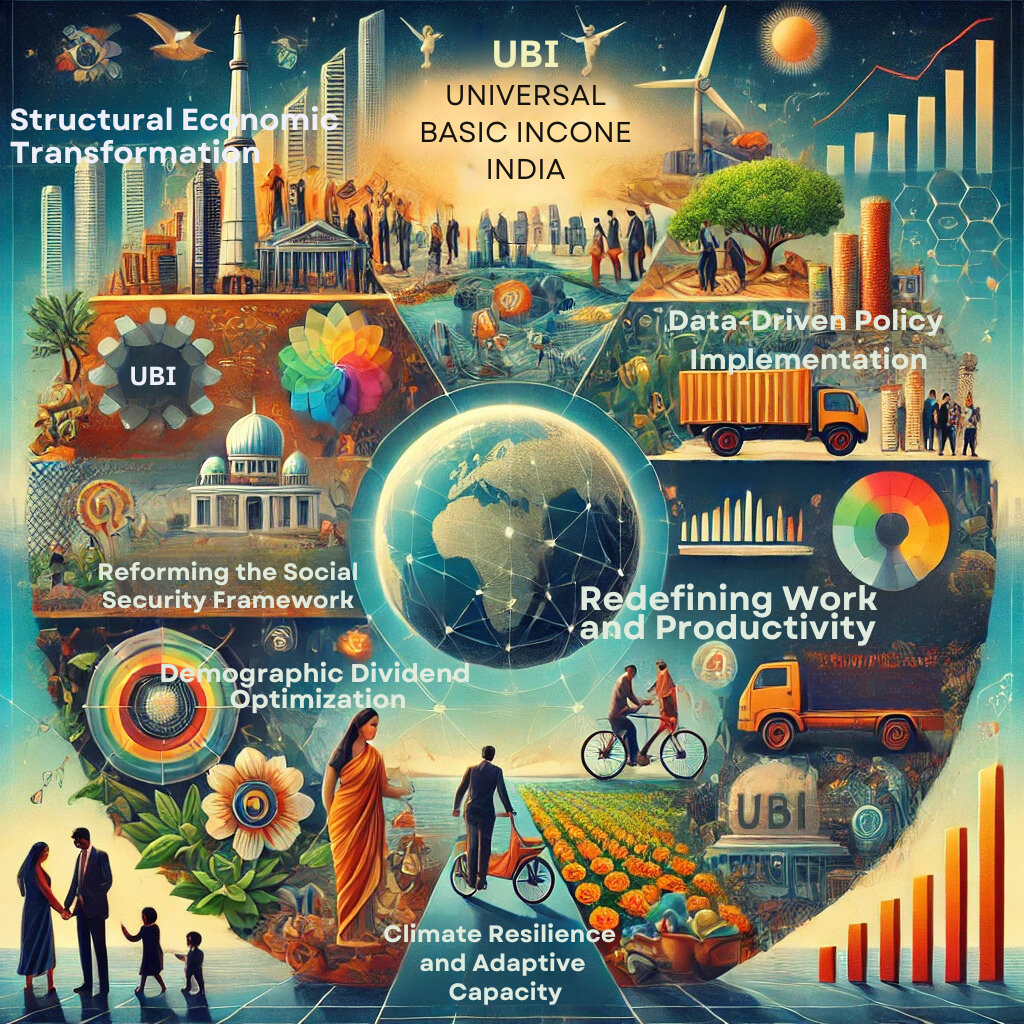There is an interest in Universal Basic Income (UBI) as a means of looking into the unemployment and inequality problems in India. UBI involves giving a predetermined income to every citizen, thus simplifying welfare systems and reducing errors in their distribution. Modified UBI may prove to be something like schemes like PM-KISAN, as it could offer a basic safety net combined with a reduced administrative cost to tide over fiscal challenges. Examining the feasibility of UBI in India, its potential benefits, and practical implementation hurdles is the core of this editorial.
| GS Paper | GS Paper I, GS Paper II, GS Paper III |
| Topics for UPSC Prelims | Universal Basic Income, PM-KISAN, Economic Survey 2023-24, Targeted Public Distribution System, Central Sector Schemes, World Bank, National Sample Survey, Household Consumption Expenditure Survey, G20 presidency in 2023, Gig economy, Consumer Price Index, Worker Population Ratio, Ayushman Bharat-Pradhan Mantri Jan Arogya Yojana, CAG, Pradhan Mantri Kaushal Vikas Yojana. |
| Topics for UPSC Mains | Arguments in Favour and Against UBI in India, Strategies for India to Create a Strong Base for UBI. |
Origin of the Article
This editorial is based on “A modified UBI policy may be more feasible” which was published in The Hindu on 18/10/2024. The article highlights the potential of a simplified Universal Basic Income (UBI) in India, using models like PM-KISAN to provide a basic safety net. It discusses the benefits of reduced administrative costs and fewer exclusion errors while addressing fiscal and implementation challenges.
Relevance for UPSC Aspirants
While knowledge about Universal Basic Income is crucial for UPSC aspirants, it happens that the subject matter relates to topics in the GS Paper 2 and 3 syllabus, especially government policies and economic development. The study of UBI would enable an understanding of welfare economics, policy implementation, and social security systems, which are important knowledge areas both for Preliminary and Main examinations.
Why in News?
The potential of UBI in countering the winds of rising unemployment and inequality emanating from technological disruptions puts the topic back into the debate pages of Indian policy, aligning with the ideas centered by UPSC on innovative welfare solutions or reflecting on the previous questions in the context of social security and economic reforms.

Arguments in Favor of UBI in India
UBI in India can help India eradicate poverty and inequality through the universal provision of guaranteed income to all citizens of a given country. It would enhance financial security and reduce poverty, thus acting as a catalyst to stimulate economic growth, particularly among disadvantaged communities, by simplifying the welfare system.
Structural Economic Transformation
UBI may revolutionize the Indian economy with the possible solution of disguised unemployment in the agricultural sector. As pointed out in the Economic Survey 2023-24, the sector supports as much as 42.3% of the population, however, the sector contributes only around 18.2% to GDP, meaning low productivity. UBI can provide financial protection and thus allow the labor to shift from an unproductive sector like agriculture to more productive sectors akin to changes that have been witnessed in the cases of East Asian economies.
Reforming the Social Security Framework
The universal income model would therefore represent a streamlined way of reforming India’s radically decentralized social security scheme, which is very significantly marred by high exclusion errors. It may even possibly cut the complexity and budgetary demands of this system as a model, reduce errors, and align itself with the adaptive social protection framework of the World Bank. And it may also provide a more comprehensive safety net, potentially allowing targeted top-ups on specific vulnerabilities.
Demographic Dividend Optimization
India boasts of her demographic dividend consisting mainly of youngsters. High youth unemployment risks squandering this dividend. UBI can seize this opportunity by providing resources for skill development and education in this significant demographic dividend area, hence an emphasis on a considerably more skilled workforce. The aspiration of India is in the high-tech sectors and work closely through knowledge, skills, and other requirements on the skills gap reported in international reports-and hopefully innovation and economic growth.
Climate Resilience and Adaptive Capacity
UBI can make India’s climate resilience stronger in its ability to provide support during the shocks related to climate, reducing distress migration, and aiding strategies in adaptation processes. It can also fit into the concept of a “just transition” in that it establishes a safety net, making politically feasible the implementation of necessary but disruptive policies for climate change, such as carbon pricing, for the pursuit of sustainable development goals.
Redefining Work and Productivity
UBI has the potential to reshape societal perceptions of work by recognizing unpaid labor-the kind that involves care work and community service. Specifically in India, it may help create a more equitable labor distribution between people within a household because most traditional work does not get recognized. This could lead to a more inclusive definition of what constitutes productivity and societal contribution.
Data-Driven Policy Implementation
UBI would revolutionize data-driven policymaking in India by collecting vast amounts of data on income and consumption patterns, thereby making it possible for evidence-based governance through sharper and more effective economic policies. Digital payments part and parcel of UBI can expand this potential, thus making possible responsive and nuanced policy decisions.
Geopolitical Soft Power and Global Leadership
A successful program could further strengthen India’s lead in social policy globally, improving its soft power and influence in discussions around the world regarding inequality. In this context, the Indian experiment could provide very useful experience for other developing nations as debates about UBI spread globally.
Addressing Extreme Poverty and Malnutrition
An interesting example of this is India, which has recently experienced economic growth but still severely suffers from poverty and malnutrition. The potential direct impact of UBI is an increase in the incomes of the poor themselves to reduce poverty and improve nutrition. Indeed, a constant stream of income would help in mitigating the prevailing serious level of hunger in the country. The existence of hunger at this serious level has been underlined by indices abroad.
Fostering Entrepreneurship and Innovation
UBI will give financial security, so encourages entrepreneurial ventures in risk and innovation – critical for India’s economic goals and growth of the gig economy. UBI could serve as a seed fund for micro-entrepreneurs, particularly in rural areas, to bridge the transition to the USD 5 trillion economy.
Arguments Against UBI in India
Some of the arguments against UBI in India are that the fiscal cost of such a program would be too high, and it may trigger inflation; in addition to discouraging work, this may also impose enormous pressure on public finances, together with worsening existing welfare programs for vulnerable populations.
Fiscal Unsustainability
The fiscal challenge of UBI in India would be that an additional cost burden might be placed on the government, and this might start to strain public finances, potentially via essential cuts in services or resultant unsustainable deficits. This does raise concern for the government as far as its fiscal consolidation efforts are concerned, thus making an urgent assessment regarding the fiscal viability of UBI necessary.
Inflationary Pressures
Cash distribution at scale through UBI can increase inflation, particularly in supply-constrained industries. This is one of the significant challenges India faces because there have been bouts of inflation the country has faced lately. Hence, the demand-pull source of inflation is also one of the critical factors whereby the economic implication of UBI on scale should be treated with deliberation.
Labor Market Distortions
Critics argue that UBI may create disincentives for labor. When there’s a guarantee of income, regardless of work, one might see a drop in labor participation in sectors that are important to India’s development- particularly agriculture and construction. That might be a distortion of sorts that calls for a more balanced implementation.
Targeting and Equity Concerns
Such a universal UBI program might even unintentionally reach both the poor and non-poor, thus raising equity as well as concerns with the allocation of resources. In a country with wide income inequality, such a homogeneous approach is regarded as regressive and reminds about focusing resources on higher priorities.
Implementation Challenges
Implementation of UBI across the vast socio-economic landscape in India will be a herculean task. Even though credit and identity verification are improving, there is bound to be errors in exclusion due to network connectivity issues. On the other hand, leakage is probable; hence proper systems would be necessary for easy delivery.
Opportunity Cost and Development Trade-offs
The enormous resources that UBI demands may sidestep financial flows to the critical sectors of health and education. Public spending in health and education is already low, and more uses for UBI may likely check improvement in these fields, which calls for smartness in strike-offs and resource allocation priorities.
Global Economic Competitiveness
UBI could put upward pressure on wages, making India less competitive in labor-intensive industries. It is the lower cost of labor that has so far been India’s competitive advantage to attract investment and increase exports. These are areas wherein UBI should not compromise.
Major UBI Experiments Across the Globe
A number of such UBI experiments have been undertaken around the world to realize its effects on the incidence of poverty, behavior at work, and welfare. Finland, Canada, and Kenya-based experiments have led to some interesting findings regarding the feasibility of UBI policies.
United States
For the U.S. case, the Alaska Permanent Fund was utilized as an example to distribute funds each year, which came from oil revenues. The Freedom Dividend, another proposal, sought to address automation-related issues of job loss through cash injections every month, which reflected different options for UBI in the American view.
Norway
Norway does not have a UBI but provides every aspect of social security through its welfare state model, which can be equated to the concept of UBI. People access education and health care, but they must meet certain terms and conditions for this access. It shows how policymakers can interweave some aspects of UBI into overall social policies.
Finland
Finland has been conducting an experiment on basic income whereby citizens who do not have a job receive a set of monthly cash to presumably improve social well-being and reduce bureaucratic nuisance. Although not a UBI program, the effort was able to show some potential benefits as well as some challenges, and these continue to shape an ongoing debate about whether a UBI should be feasible.
Brazil
Bolsa Família, the conditional cash transfer program among the poor in Brazil, bears some resemblance to UBI. Though targeted toward the poor, this has, for the most part improved living standards and access to necessities for millions of beneficiaries, serving as an example of how targeted income support often can help fight against poverty and inequality.
Pathways for UBI Implementation in India
A careful planning strategy will introduce UBI. It includes phased rollouts, targeted beneficiaries, and restructuring of existing welfare schemes. Sustainability of funding mechanisms; technological infrastructure; and political will appear essential to ensure a smooth introduction of UBI in consonance with economic stability and social equity.
Phased Implementation and Pilot Programs
India can start UBI pilots in specific circumstances to analyze their performance. This experiment can overcome the issues it faces, such as being over-long or too short. Learning from past experiments, such as those in Sikkim and Madhya Pradesh, these pilots could cover diverse regions and last for long periods to capture long-term impacts.
Leveraging Digital Infrastructure
The JAM trinity speaks to improving the foundation in the form of digital infrastructure that India would be setting for UBI implementation. Improving last-mile connectivity along with digital skills, especially in rural areas, would add muscle to the implementation of UBI; distributing it and making people financially included through all government undertakings already underway, such as BharatNet.
Gradual Consolidation of Existing Schemes
We could take a gentle step toward UBI by consolidating existing welfare programs and starting with those that are less effective. For instance, turning subsidies into direct cash transfers might streamline the social support systems, thus making transformation smoother and easier to monitor the impact on the beneficiaries.
Progressive Funding Mechanism
India could pursue progressive funding strategies for UBI through increased taxation and rationalization of subsidies to ensure it is fiscally sustainable. The increased collection of GST along with the reduction in exemptions on corporate taxes provide potential resources for funding UBI.
Adaptive Payment Structure
An adaptive structure of UBI with base payments and additional allowances for vulnerable groups can mitigate some concerns on work disincentives. Similar to the approach taken by China’s diablo system, it helps maintain sustainability and effectiveness in supporting the diverse needs of the population.
Integration with Skill Development and Employment Programs
This could help moderate labor market consequences, as UBI integrates with other skill development initiatives like PMKVY. The incentive offered to train for UBI would align with demographic goals in India by addressing skill gaps and fostering economic growth.
Robust Monitoring and Evaluation System
A full monitoring and evaluation system based on big data and AI will become a crucial prerequisite for UBI’s success. Regular social audits and independent assessments would ensure the entire process’s transparency and inform optimization, thereby affecting accountability and effectiveness.
PESTEL Analysis
| Political: Implementation of UBI in India requires strong political commitment and stability. Efficient governance is essential to manage the streamlined disbursements of UBI, ensuring the minimization of fraud and optimal use of resources. Economic: UBI could serve as an economic redistributive mechanism, potentially increasing consumption and demand by providing stable income support to all citizens. However, it poses significant fiscal challenges, potentially increasing taxes or reallocating funds from other important budget areas. The economic impact also includes potential inflationary pressures if not properly managed. Social: UBI has the potential to significantly reduce social inequality and poverty by guaranteeing a minimum income for all, which could uplift the lower economic strata. It supports demographic advantages by providing the youth with opportunities for education and skill development. Additionally, it may cause cultural shifts by valuing unpaid work and allowing people to engage in more fulfilling activities. Technological: The success of UBI depends heavily on India’s digital infrastructure, which would handle the transfer of funds. Implementing UBI could also provide valuable data on consumer behavior and economic patterns, aiding in further policy refinement. Environmental: UBI can support environmental sustainability by providing financial stability, which may encourage investments in green technologies and sustainable practices. It also helps communities manage the economic effects of climate change, such as disruptions in agriculture. Legal: A comprehensive legal framework is necessary to support the establishment of UBI, redefining welfare entitlements and ensuring nationwide compliance across diverse local regulations. |
Conclusion
In such a world where economic disparities and technological turmoil dominate, UBI shines bright for India. For aspirants of UPSC, it’s very important to comprehend the intricacies of UBI with its merits and demerits as it questions the stand of conventional economic policies and challenges towards innovative governance.
| UPSC Civil Services Examination, Previous Year Questions (PYQs) Mains Q. In what way could the replacement of price subsidy with Direct Benefit Transfer (DBT) change the scenario of subsidies in India? (UPSC Mains 2015, GS Paper III) Q. Discuss the feasibility and desirability of implementing Universal Basic Income (UBI) in India. What lessons can India draw from cash transfer schemes like PM-KISAN to design a modified UBI scheme? |



